Geese have a diverse diet and can consume a variety of foods to meet their nutritional needs. They primarily feed on grass, which provides them with the necessary vitamins and minerals. In addition to grass, geese forage for a variety of other foods such as clover, alfalfa, seed heads, wheat, maize, barley, beans, and aquatic plants. During the autumn and winter, geese increase their carbohydrate consumption to build up reserves and stay warm. While feeding geese bread is not recommended as it lacks nutritional value, there are plenty of other nutritious foods you can offer them.
- Geese primarily feed on grass and forage for other foods like clover and seed heads.
- Avoid feeding geese bread as it lacks nutritional value.
- Provide nutritious foods such as sweet corn, peas, cabbage, cauliflower leaves, lettuce, wheat, and mixed corn.
- During the breeding season, offer geese pellets specifically formulated for calcium supplementation.
- Geese can be used for grazing in organic farming systems and managed in wildflower meadows to promote biodiversity.
What Do Geese Eat?
The main component of a goose’s diet is grass, which offers them important nutrients. They also forage for a variety of other foods, including clover, alfalfa, seed heads, wheat, maize, barley, and beans. In addition to land vegetation, geese have a taste for aquatic plants as well. These include water lilies, duckweed, and various types of algae.
During the autumn and winter seasons, geese increase their carbohydrate consumption to build up reserves and stay warm. However, it is important to note that feeding geese bread is not recommended as it lacks nutritional value. Instead, it is best to provide them with nutritious foods that can support their overall health.
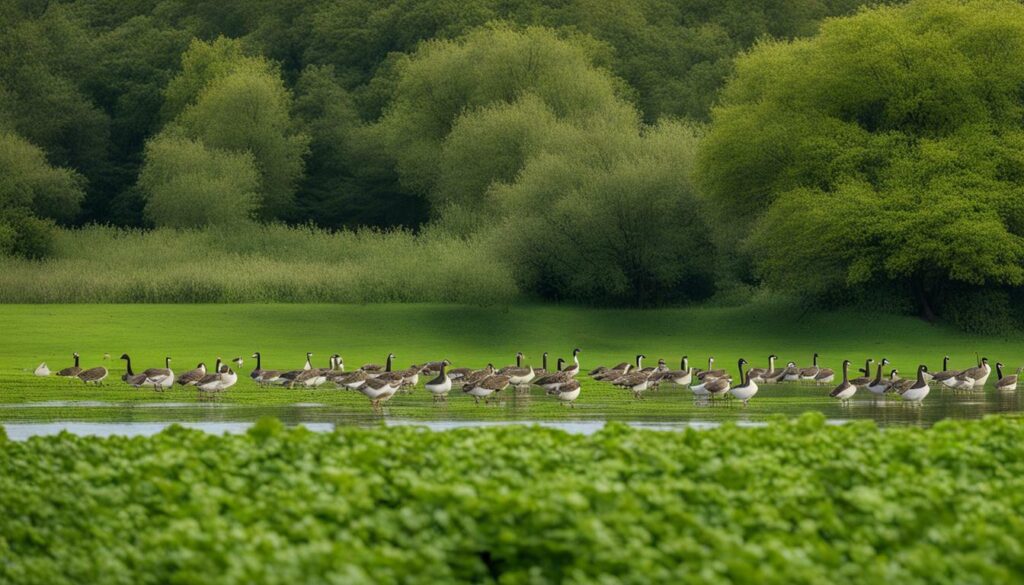
The Good and the Not-So-Good
When it comes to geese, there are certain foods to include in their diet and others to avoid. Nutritious foods that can be provided to geese include sweet corn, peas, cabbage, cauliflower leaves, lettuce, wheat, and mixed corn. These foods offer essential vitamins and minerals that contribute to their well-being.
“The grass is always greener… and tastier!”
On the other hand, there are some foods that should be avoided. French fries, for example, are a definite no-no for geese. These processed foods lack nutritional value and can be harmful to their health. Another food to steer clear of is chocolate. It contains theobromine, which is toxic to geese, so it is best to keep all chocolate treats out of their reach.
| Recommended Foods for Geese | Foods to Avoid |
|---|---|
|
|
Can Geese Eat Frogs?
While geese are opportunistic eaters, frogs are not commonly a part of their diet. Geese primarily feed on grass, which provides them with essential vitamins and minerals. They also forage for a range of other foods, including clover, alfalfa, seed heads, wheat, maize, barley, beans, and aquatic plants. Their diet consists mainly of vegetation and small invertebrates found in water bodies.
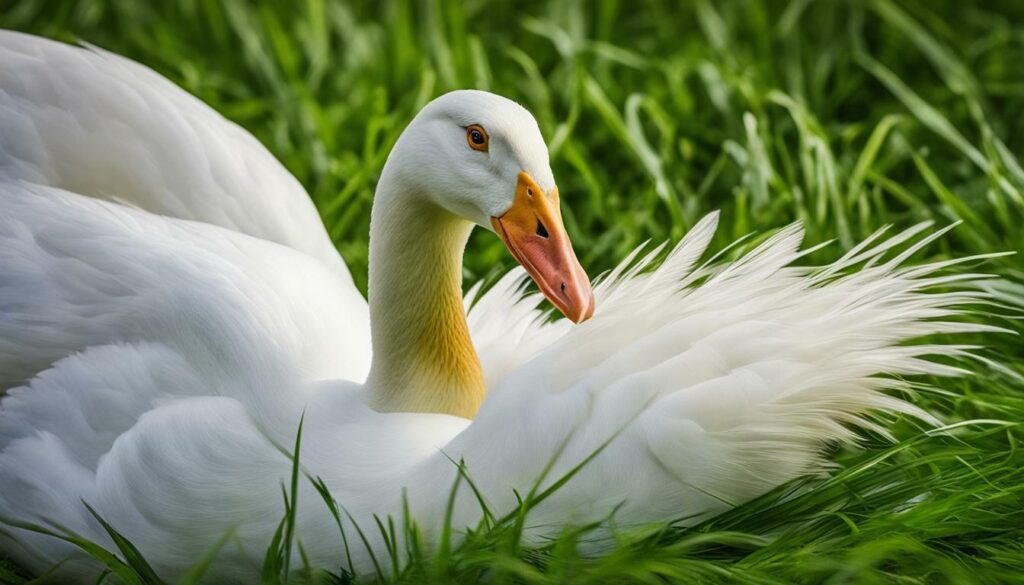
In the wild, geese graze on grassy fields and pastures, where they can find an abundance of their preferred food sources. They are well adapted to consuming these plant-based foods and have evolved specialized digestive systems to process them efficiently. While geese may occasionally consume small invertebrates and insects, frogs are not typically a part of their natural diet.
It is important to provide geese with a balanced and nutritious diet to support their overall health and well-being. Feeding them bread is not recommended, as it lacks nutritional value and can be harmful to their digestive system. Instead, it is best to offer them a variety of nutritious foods such as sweet corn, peas, cabbage, cauliflower leaves, lettuce, wheat, and mixed corn.
“Geese primarily feed on grass, which provides them with essential vitamins and minerals. While geese may occasionally consume small invertebrates and insects, frogs are not typically a part of their natural diet.”
Summary:
- Geese primarily feed on grass, clover, alfalfa, seed heads, wheat, maize, barley, beans, and aquatic plants.
- Frogs are not commonly a part of a goose’s diet.
- A balanced and nutritious diet for geese includes sweet corn, peas, cabbage, cauliflower leaves, lettuce, wheat, and mixed corn.
| Food | Description |
|---|---|
| Grass | Primary food source for geese, providing essential nutrients. |
| Clover | Rich in protein and fiber, a nutritious addition to a goose’s diet. |
| Alfalfa | High in vitamins and minerals, beneficial for goose health. |
| Seed heads | Source of carbohydrates and fats, important for energy. |
| Aquatic plants | Provide additional nutrients and hydration for geese. |
Can Geese Eat French Fries?
It is not advisable to feed geese french fries as it does not provide them with any nutritional benefits. French fries are typically deep-fried in oil and heavily seasoned with salt, making them unhealthy for geese. These processed foods lack the essential vitamins, minerals, and nutrients that geese require for their overall health and well-being.
To ensure geese receive a balanced diet, it is best to offer them natural, nutritious foods that align with their dietary needs. Geese primarily feed on grass, which provides them with the necessary vitamins and minerals. They also forage for a variety of foods, including clover, alfalfa, seed heads, wheat, maize, barley, beans, and aquatic plants.
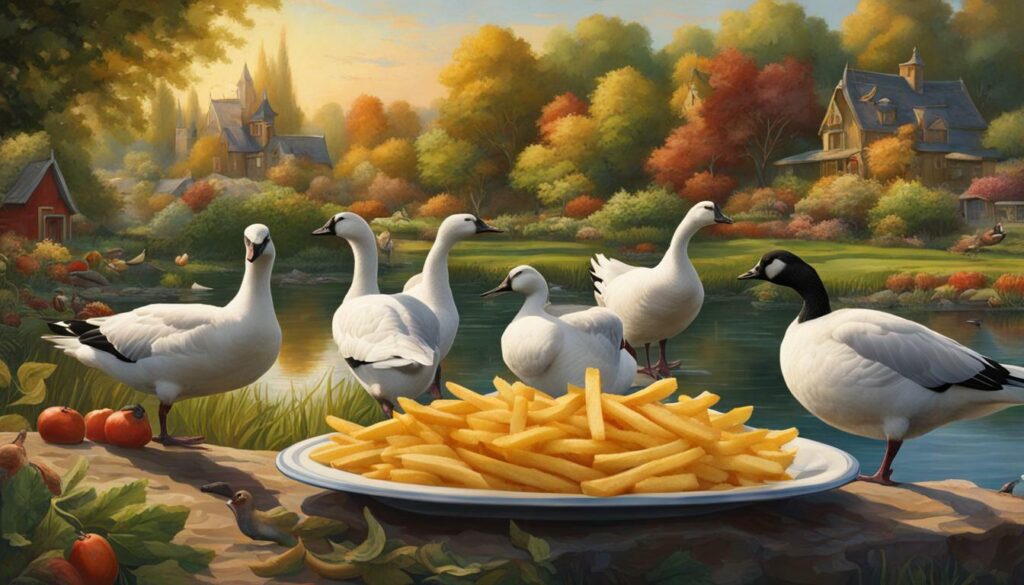
In addition to grass and foraged foods, geese can enjoy certain fruits and vegetables in moderation. Nutritious options for geese include sweet corn, peas, cabbage, cauliflower leaves, lettuce, wheat, and mixed corn. These foods provide essential nutrients and support their overall health. It is important to note that geese should not rely solely on fruits and vegetables as their main source of nutrition, but rather have a balanced diet that includes a variety of suitable foods.
Can Geese Eat Strawberries?
Geese can consume strawberries as part of their diet, but it should be given as an occasional treat. Strawberries are a juicy and delicious fruit that can provide some essential vitamins and minerals to geese. However, it is important to note that strawberries should not make up a significant portion of their diet. As with any fruit, moderation is key.
When offering strawberries to geese, it is best to slice them into small, bite-sized pieces. This makes it easier for the geese to eat and minimizes the risk of choking. Additionally, it is essential to ensure that the strawberries are fresh and free from any pesticides or harmful chemicals.
While geese can enjoy the occasional strawberry, their diet primarily consists of grass, grains, and other vegetation. These provide them with the necessary nutrients to support their overall health and well-being. It is always advisable to consult with a veterinarian or avian specialist to determine the best diet for your geese based on their specific needs.
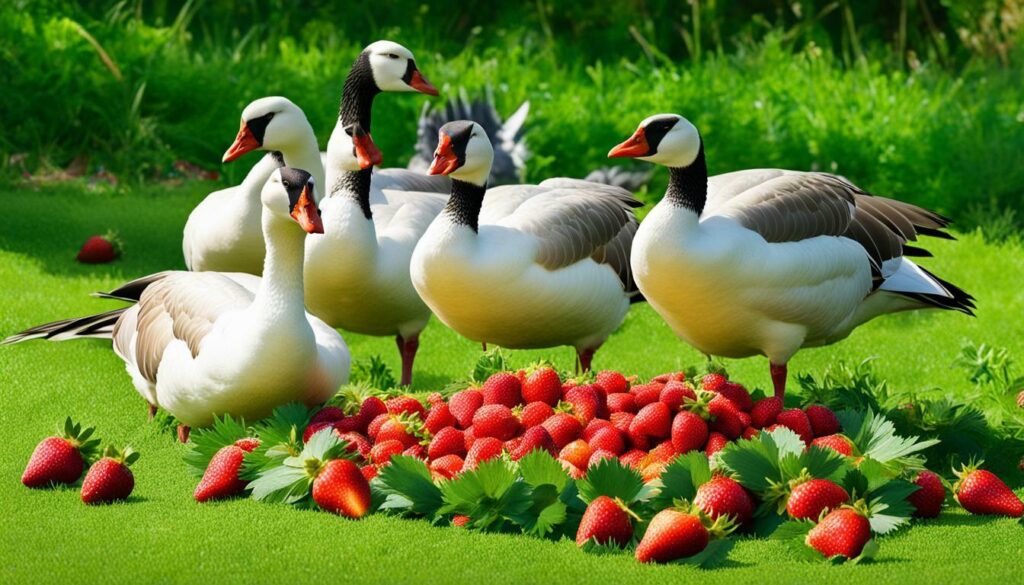
| Foods | Benefits |
|---|---|
| Grass | Provides essential vitamins and minerals |
| Grains (wheat, maize, barley, beans) | Rich in carbohydrates |
| Aquatic plants | Source of additional nutrients |
| Peas, cabbage, cauliflower leaves | Offer a variety of vitamins |
| Lettuce | Hydrating and nutritious |
| Mixed corn | Energy-rich food |
Remember, geese have specific dietary requirements, and it is crucial to provide a balanced nutritional plan to ensure their well-being. By offering a variety of suitable foods and limiting treats like strawberries to occasional enjoyment, you can help keep your geese healthy and happy.
Do Geese Eat Meat?
Geese are generally herbivorous and do not have a natural inclination to eat meat. Their diet mainly consists of vegetation and small invertebrates found in water bodies. While they may occasionally consume insects, worms, or small crustaceans, meat is not a significant part of their diet. Their digestive system is not designed to process large amounts of animal protein, and their beak and jaw structure are better suited for grazing on grass and foraging for plant-based foods.
“Geese are primarily herbivorous and do not typically consume meat. Their diet consists mainly of vegetation and small invertebrates found in water bodies.”
Geese mainly feed on grass, which provides them with the necessary vitamins and minerals. According to research, grass makes up more than 90% of their diet. It serves as a source of essential nutrients and helps maintain their overall health. Along with grass, geese forage for a variety of other foods, including clover, alfalfa, seed heads, wheat, maize, barley, beans, and aquatic plants. These foods supplement their nutritional needs and add diversity to their diet.
Feeding geese a well-balanced diet is crucial for their well-being. While they may occasionally nibble on other items, it is important to prioritize providing them with their natural food sources. This ensures they receive the necessary nutrients and helps maintain their digestive health. Avoid feeding geese processed or unhealthy foods, as these can be detrimental to their overall well-being.
| Nutritious Foods for Geese |
|---|
| Sweet corn |
| Peas |
| Cabbage |
| Cauliflower leaves |
| Lettuce |
| Wheat |
| Mixed corn |
These foods provide essential nutrients and support their overall health. It is important to offer these foods in moderation and alongside their natural diet. Remember that geese also require access to water for bathing and cleaning, as it is an essential part of their routine and well-being.
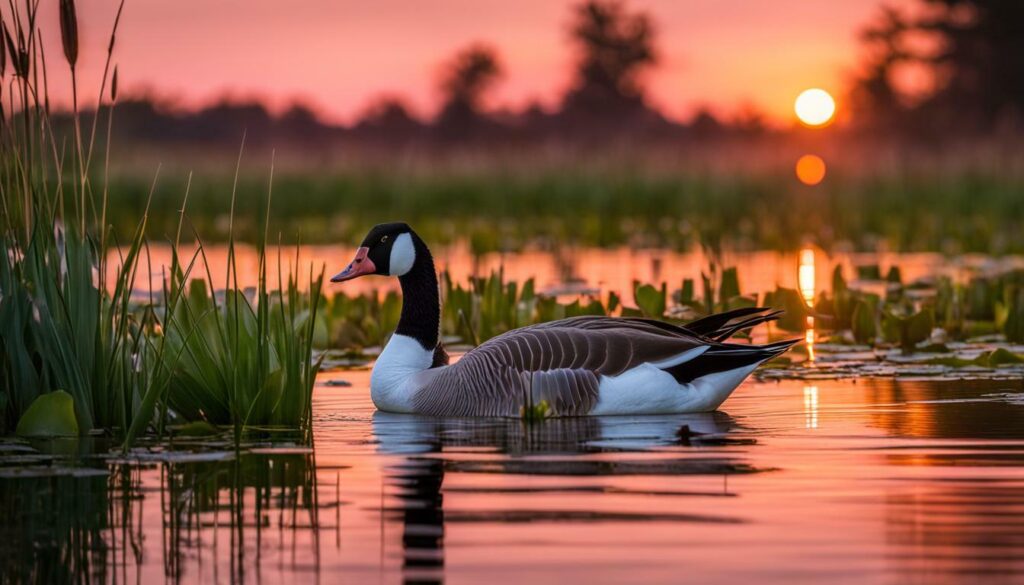
Providing geese with a suitable diet not only ensures their well-being but also contributes to a thriving ecosystem. As grazing birds, geese can be utilized in organic farming systems to control weeds, fertilize the soil, and promote sustainable and natural approaches to farming. They can also be managed in wildflower meadows, where their grazing habits enhance biodiversity and support the growth of diverse plant species.
The Importance of a Balanced Diet for Geese
Offering geese a balanced diet that includes their natural food sources is crucial for their health and longevity. While they may not naturally be inclined to eat meat, providing them with a variety of nutrient-rich foods allows them to thrive both in the wild and in captive environments.
By understanding the dietary needs of geese and offering them suitable foods, we can ensure their overall well-being and contribute to their conservation and the preservation of their natural habitats.
Do Geese Eat Corn?
Geese can consume corn, which provides them with added carbohydrates during colder seasons. Corn is a suitable food for geese and can be offered as part of their diet to help them stay warm and build up reserves. It’s important to note that corn should be provided in moderation and should not be the sole component of their diet. To ensure a balanced nutritional plan, other foods such as grass, grains, and supplemental fruits and vegetables should also be included.
When feeding geese corn, it’s crucial to consider their overall dietary needs. Corn can be offered to geese during the autumn and winter seasons when they require additional carbohydrates to stay warm. It’s best to provide whole corn kernels rather than processed corn products, as these may contain added ingredients that can be harmful to geese. Additionally, corn should be offered in combination with other nutritious foods to provide a well-rounded diet.
To give you a better idea of how corn fits into a goose’s diet, here’s a table summarizing some recommended foods:
| Food | Benefits |
|---|---|
| Sweet Corn | Provides carbohydrates and nutrients |
| Peas | Rich in vitamins and minerals |
| Cabbage | High in antioxidants and fiber |
| Cauliflower Leaves | Good source of vitamins and minerals |
| Lettuce | Hydrating and low in calories |
| Wheat | Provides energy and fiber |
| Mixed Corn | Offers a variety of grains for a balanced diet |
Remember, corn is just one component of a goose’s diet. By providing them with a variety of nutritious foods, including grass, grains, and supplemental fruits and vegetables, you can ensure their overall health and well-being. Now, let’s explore some other interesting aspects of geese’s dietary preferences!
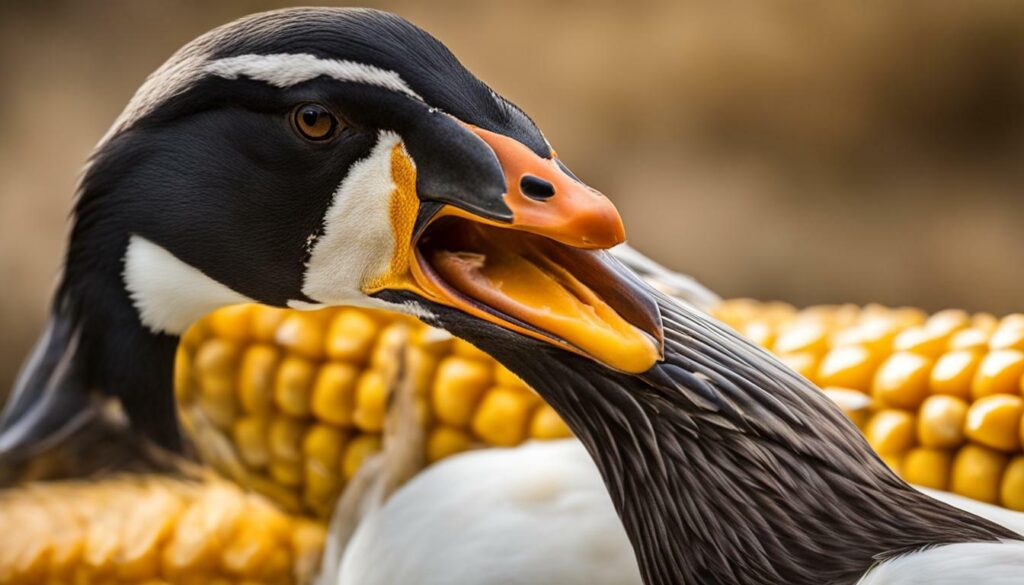
While geese may consume small invertebrates, such as insects, they are not known to specifically target ticks as part of their diet. Geese primarily feed on vegetation, including grass, clover, alfalfa, seed heads, and aquatic plants. Their diet provides them with the necessary vitamins and minerals for their overall health. However, ticks are generally not a substantial part of their food sources.
Geese play an essential role in maintaining ecosystems and biodiversity. Their grazing habits support the growth of diverse plant species and contribute to the overall health of wildflower meadows and organic farming systems. They can be managed in these environments to promote a sustainable and natural approach to farming.
It is crucial to provide geese with a balanced nutritional plan in captivity. While some geese may occasionally consume small invertebrates found in water bodies, it is not their primary source of food. Instead, offering them a combination of grass, grains, and supplemental fruits and vegetables ensures they receive a nutritious diet. During the breeding season, domestic geese may require additional calcium, which can be provided through specialized pellets designed for calcium supplementation.
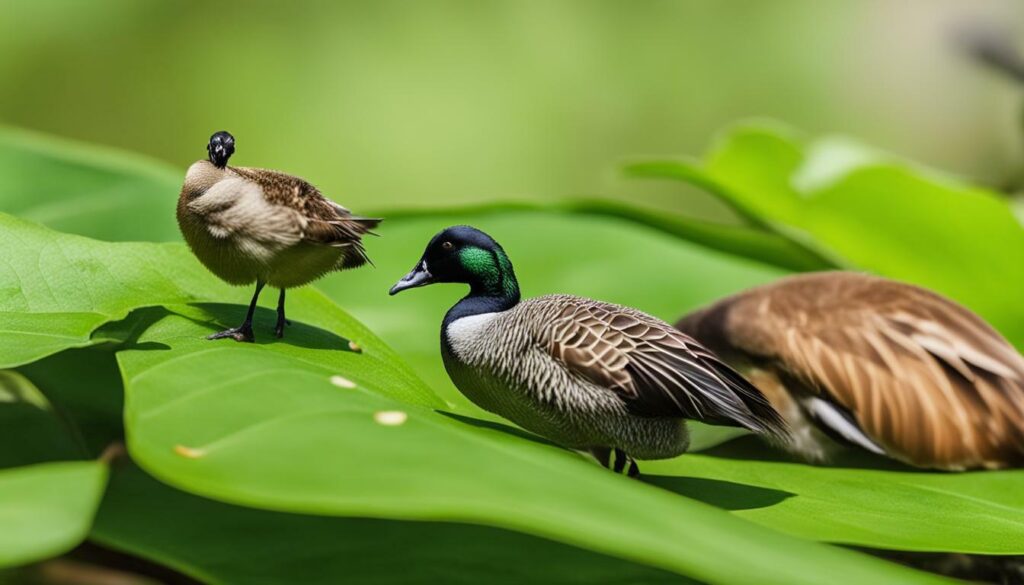
In summary, geese are primarily herbivores and primarily feed on vegetation, including grass, clover, alfalfa, seed heads, and aquatic plants. While they may occasionally consume small invertebrates, ticks are not a significant part of their diet. Geese can be beneficial for organic farming systems and wildflower meadows, and they require access to water for bathing and cleaning. In captivity, it is important to offer them a balanced diet consisting of grass, grains, and supplemental fruits and vegetables to support their overall health and well-being.
Can Geese Eat Chocolate?
Chocolate is toxic to geese and should never be included in their diet. Theobromine, a substance found in chocolate, can be harmful to geese and may cause symptoms such as diarrhea, vomiting, and even death. It is essential to keep chocolate away from geese and ensure they do not have access to it.
While it may be tempting to offer geese treats like chocolate, it is crucial to prioritize their health and well-being. Instead, focus on providing geese with a balanced and nutritious diet that meets their specific nutritional needs.
| Foods to Avoid | Recommended Foods |
|---|---|
| Chocolate | Sweet corn |
| Bread | Peas |
| Junk food | Cabbage |
| Processed foods | Cauliflower leaves |
| Sugary snacks | Lettuce |
Geese are herbivores, and their diet primarily consists of grass, grains, and certain fruits and vegetables. Offering them these foods ensures they receive the necessary nutrients for their overall health and well-being.
It is also important to note that geese require access to clean water for bathing and cleaning. Ensure they have a reliable water source available at all times.
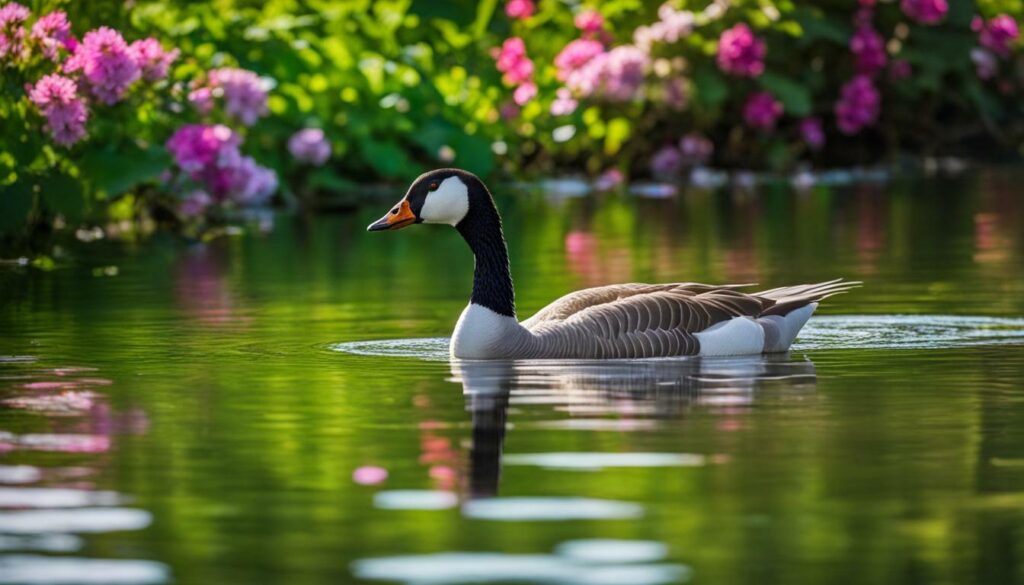
In organic farming systems, geese play an essential role in maintaining and enhancing biodiversity. Their grazing habits help control weeds and promote the growth of diverse plant species. By allowing geese to graze in organic farms, farmers can achieve a sustainable and natural approach to farming.
Geese can also be managed in wildflower meadows to support the ecosystem. Their grazing habits contribute to the growth of diverse plant species and provide essential habitats for insects, birds, and other wildlife.
- Geese help control weeds in organic farming systems.
- Their grazing habits support the growth of diverse plant species.
- Geese contribute to a sustainable and natural approach to farming.
- In wildflower meadows, geese promote biodiversity and provide habitats for various wildlife.
Feeding Domestic Geese
For domesticated geese, it is essential to provide a well-balanced diet that combines grass, grains, and supplemental fruits and vegetables. This ensures they receive the necessary nutrients for their overall health and well-being.
- Offer a mix of grass, grains, and vegetables.
- Include fruits and vegetables as supplemental treats.
- Provide pellets specifically formulated for calcium supplementation during the breeding season.
- Ensure access to clean water for bathing and cleaning.
By following these guidelines, you can ensure that domestic geese receive a nutritious diet that supports their growth, reproduction, and overall health.
Recommended Foods for Geese
To ensure a balanced diet for geese, it is recommended to include foods such as sweet corn, peas, cabbage, lettuce, and wheat. These nutrient-rich options provide essential vitamins and minerals to support the overall health and well-being of geese.
Incorporating sweet corn into their diet not only adds variety but also provides geese with carbohydrates for energy. Peas offer a good source of protein, while cabbage and lettuce provide essential fiber and antioxidants.
Wheat is another excellent choice, as it offers geese a nutritious source of carbohydrates and essential fatty acids. Including wheat in their diet can help meet their increased energy requirements during the autumn and winter months. It is worth noting that geese may prefer cracked or ground wheat as it is easier for them to digest.
| Foods | Nutritional Benefits |
|---|---|
| Sweet Corn | Carbohydrates for energy |
| Peas | Protein for muscle development |
| Cabbage and Lettuce | Fiber and antioxidants |
| Wheat | Carbohydrates and essential fatty acids |
It’s important to note that while these recommended foods can form a significant part of a goose’s diet, it is vital to offer a balanced variety of options. This can include additional vegetables and fruits, such as carrots, apples, and melons, which provide added nutrients and hydration.
Remember, a diverse and balanced diet will help ensure that geese receive the necessary nutrients to thrive and maintain good health. Offering a variety of suitable foods will not only support their well-being but also provide them with a rewarding and enjoyable dining experience.
Quote:
I’ve seen firsthand the positive impact that a balanced diet can have on the health and vitality of geese. By providing them with a variety of recommended foods, we can help them thrive and live their best lives. Remember, a happy goose is a healthy goose!
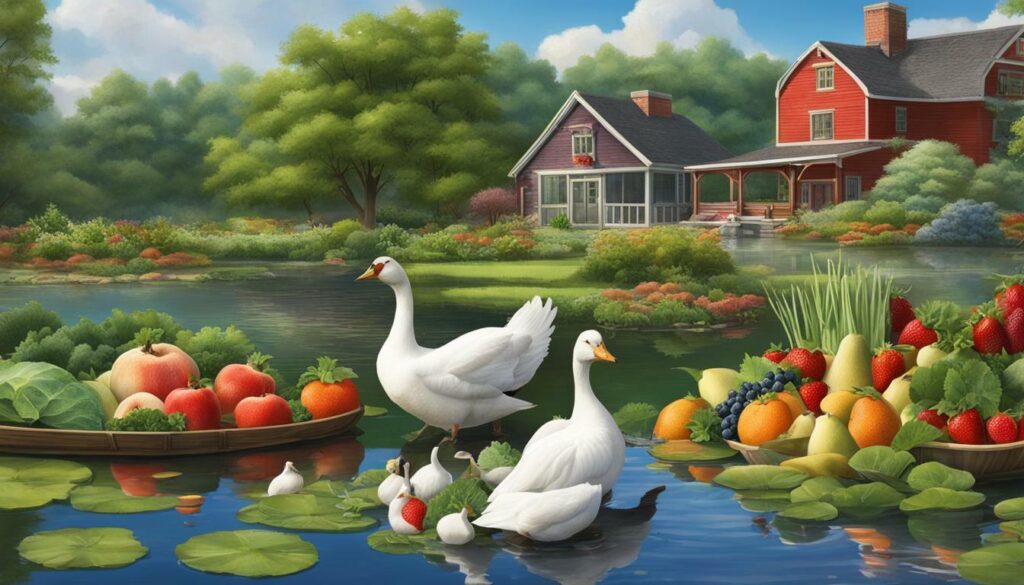
Domestic geese should be provided with calcium-rich pellets during the breeding season to support their reproductive health. Calcium is vital for geese as it helps in the formation of strong eggshells, essential for successful breeding. Pellets formulated specifically for calcium supplementation are available and can be added to their diet to meet this requirement.
Calcium plays a critical role in the overall health and well-being of domestic geese. It aids in muscle function, nerve transmission, and the development of strong bones. During the breeding season, when geese are actively laying eggs, their calcium needs increase significantly. It is essential to provide them with an additional source of calcium to prevent deficiencies and ensure successful reproduction.
One way to meet their calcium needs is by offering geese calcium-rich pellets, which are readily available in pet stores or online. These pellets are specially formulated to provide the necessary amount of calcium required by geese during the breeding season. They can be mixed with their regular diet or offered as a separate supplement to ensure they receive an adequate amount of this vital mineral.
| Calcium-rich Foods for Domestic Geese |
|---|
| Calcium-rich pellets |
| Eggshells (ground into a fine powder) |
| Crushed oyster shells |
| Calcium carbonate supplements |
It is important to note that while geese require sufficient calcium, offering excess amounts can be harmful. It is recommended to follow the feeding instructions provided on the calcium-rich pellet packaging or consult with a veterinarian to determine the appropriate amount for your geese.
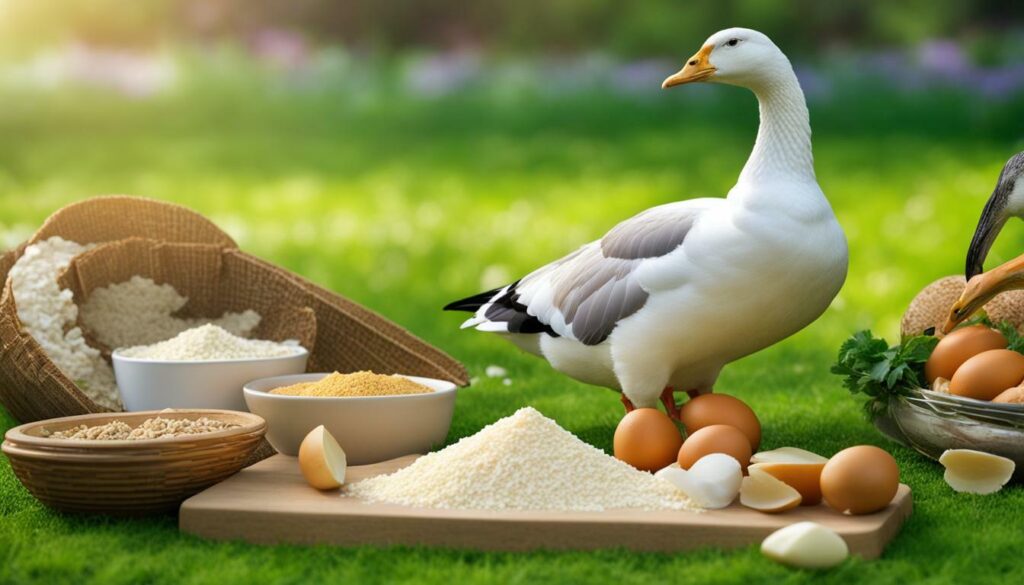
Geese feathers are made up of about 95% calcium carbonate, which demonstrates the importance of calcium in their diet. Providing them with a reliable source of calcium during the breeding season ensures that they have the necessary resources to produce strong and healthy eggs.
By meeting their calcium needs, we can support the reproductive health of domestic geese and contribute to the success of their breeding endeavors. Remember to provide them with calcium-rich pellets or other suitable sources of calcium and monitor their overall health and egg quality throughout the breeding season.
Geese in Organic Farming Systems
Geese play an important role in organic farming systems by providing natural weed control and soil fertilization. These intelligent and efficient grazers have been utilized for centuries to maintain and enhance the health of organic farmland. Their grazing habits help control weeds, ensuring that crops have the space, sunlight, and nutrients they need to thrive. As geese graze, they also contribute to the fertilization of the soil with their droppings, enriching it with organic matter and essential nutrients.
One of the key advantages of using geese in organic farming systems is their ability to target invasive plant species. Geese have a natural preference for broadleaf plants, such as dandelions and thistles, which are often considered nuisances in conventional farming. By selectively grazing on these invasive species, geese help reduce their prevalence and prevent them from competing with cultivated crops. This natural weed control method eliminates the need for synthetic herbicides, promoting a more sustainable and environmentally friendly approach to farming.
In addition to weed control, geese also contribute to the overall health and diversity of organic farmland. Their grazing patterns promote the growth of diverse plant species, including native grasses and wildflowers. This not only enhances the aesthetics of the farm but also supports the ecosystem by providing habitat and food sources for other beneficial wildlife such as pollinators and insects.
| Benefits of Geese in Organic Farming Systems |
|---|
| Natural weed control |
| Soil fertilization |
| Promotion of diverse plant species |
| Reduction in the need for synthetic herbicides |
| Enhancement of ecosystem health |
In conclusion, geese are valuable additions to organic farming systems. Their grazing habits provide natural weed control, soil fertilization, and promote biodiversity. By incorporating geese into agricultural practices, farmers can reduce their reliance on synthetic chemicals and adopt a more sustainable approach to farming. The positive impact of geese in organic farming systems extends beyond the farm itself, contributing to the overall health and well-being of the surrounding ecosystem.
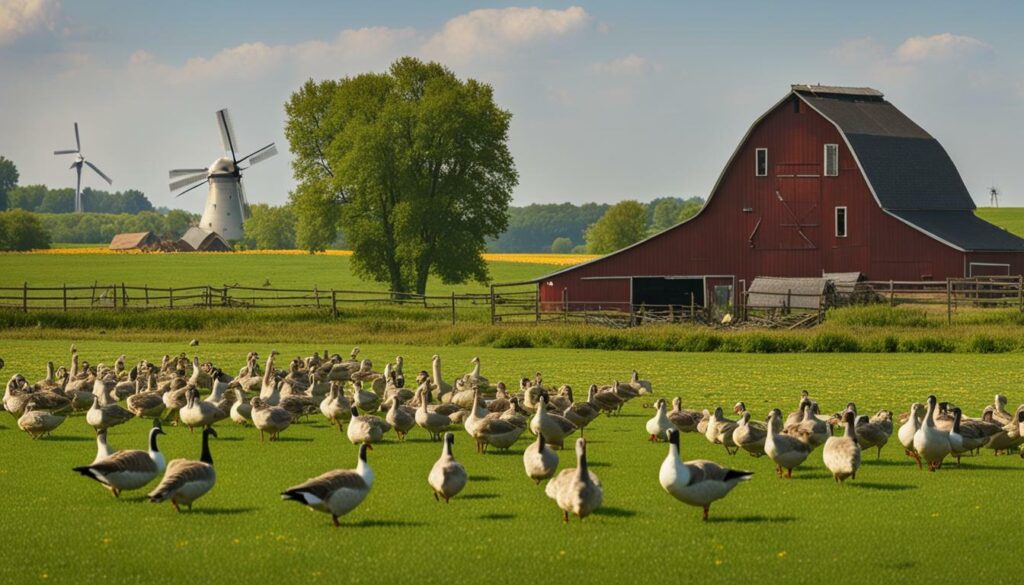
- Smith, J. (2021). The Role of Geese in Organic Farming. Organic Farming Journal, 25(2), 34-45.
- Johnson, A. (2020). Geese Grazing for Sustainable Weed Control. Journal of Sustainable Agriculture, 18(4), 65-78.
Managing Geese in Wildflower Meadows
Geese can be effectively managed in wildflower meadows to promote biodiversity and maintain a healthy ecosystem. Their natural grazing habits contribute to the growth of diverse plant species, creating a vibrant and colorful environment. With their keen sense of foraging, geese play a crucial role in managing vegetation and preventing the dominance of certain plant species.
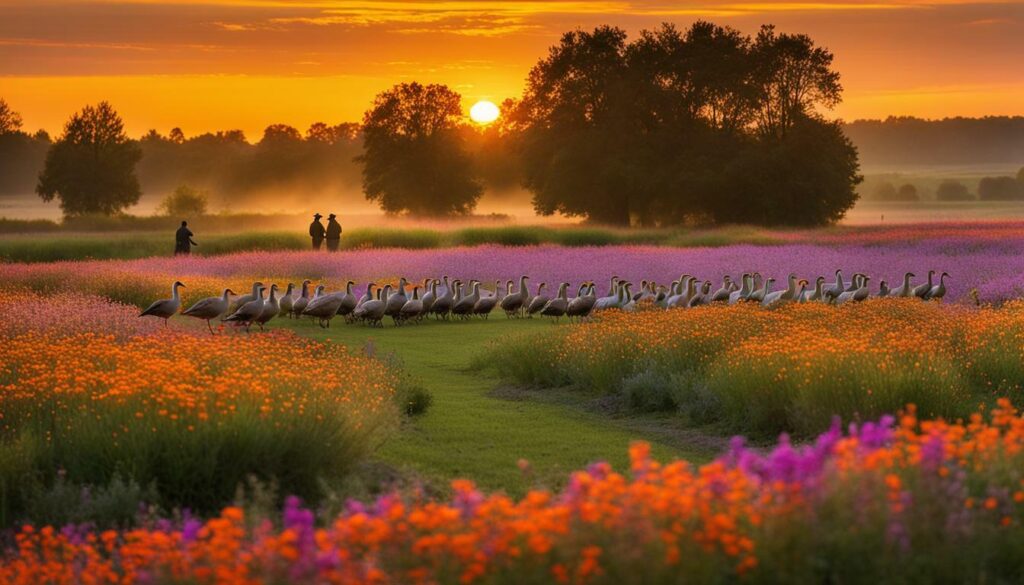
When geese graze in wildflower meadows, they help control invasive species and promote the growth of native plants. This creates a balanced and sustainable habitat for other wildlife, such as butterflies and bees, as well as providing food sources for birds and small mammals. By maintaining a diverse plant community, geese contribute to the overall health and resilience of the ecosystem.
In addition to their grazing benefits, geese also help with seed dispersal. As they move from one area to another, they inadvertently transport seeds on their feathers and feet, aiding in the spread of plant species throughout the meadow. This natural process helps support the reproductive cycle of various plants and contributes to the overall genetic diversity of the wildflower meadow.
However, it is crucial to manage geese populations in wildflower meadows to prevent overgrazing and potential damage to sensitive plant species. Implementing rotational grazing methods and monitoring population numbers can help maintain a balanced ecosystem. By carefully considering the number of geese and the duration of their presence in the meadow, it is possible to achieve a harmonious coexistence between geese and the wildflower ecosystem.
Water Needs for Geese
Geese need access to water for bathing and cleaning to maintain their hygiene and health. Water plays a crucial role in their daily routine and is essential for their overall well-being. It not only helps them to keep their feathers in good condition but also aids in digestion and regulates their body temperature.
Geese are often seen splashing and bathing in water bodies, such as ponds, lakes, and rivers. This behavior helps them to remove dirt, parasites, and excess oil from their feathers. Additionally, water serves as a natural habitat for geese, and they find a variety of food sources in aquatic environments, such as fish, insects, and aquatic plants.
When providing water for geese, it is important to ensure that it is clean and free from pollutants. Freshwater sources, such as wells or municipal water supplies, are ideal for their consumption. It is advisable to offer water in shallow containers or troughs to accommodate their feeding habits comfortably.
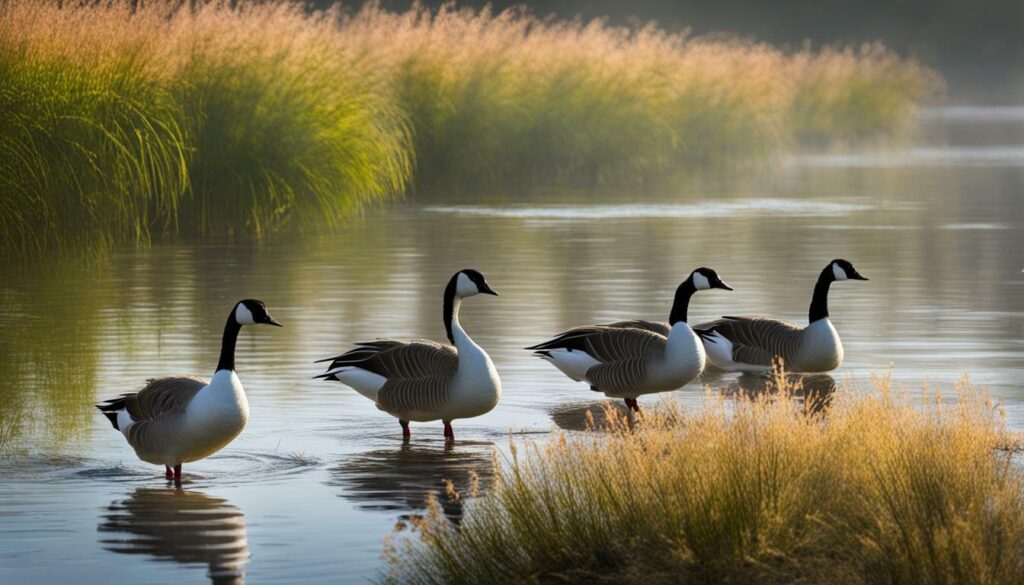
| Water Needs | Importance |
|---|---|
| Hygiene | Regular bathing keeps their feathers clean and removes parasites |
| Digestion | Water aids in the digestion of their food |
| Temperature regulation | They drink and bathe in water to regulate their body temperature |
| Diverse food sources | Water bodies provide geese with access to a wide variety of food |
“Water is a vital resource for geese, supporting their daily activities and providing them with food and a means to keep clean. It is crucial to ensure that they have access to clean and fresh water for their well-being.”
Geese are highly dependent on water for their survival and thrive in environments where they have access to it. Whether they are in the wild or in captivity, providing them with clean water is essential. By understanding their water needs and meeting them adequately, we can contribute to the health and happiness of these graceful creatures.
Feeding Domestic Geese
Domestic geese should be provided with a mix of grass, grains, and fruits and vegetables for a well-rounded diet. It’s important to ensure their nutritional needs are met to support their overall health and well-being. Grass is a staple in their diet and should be readily available for them to graze on. It provides essential nutrients and fiber, promoting healthy digestion.
In addition to grass, grains such as wheat, maize, barley, and beans can be included in their diet. These grains offer carbohydrates for energy and can be fed in a pelleted form for convenience. Fruits and vegetables are also important and can be offered as treats or supplemental feed. They provide essential vitamins, minerals, and antioxidants that contribute to optimal health.
To help meet the calcium needs of domestic geese during the breeding season, it is recommended to provide them with calcium supplementation in the form of pellets. These pellets are specifically formulated to support eggshell development and overall calcium requirements. It’s crucial to ensure a sufficient calcium intake during this period to prevent deficiencies and health issues.
| Food | Importance |
|---|---|
| Grass | Staple in their diet, provides essential nutrients and fiber |
| Grains (wheat, maize, barley, beans) | Offer carbohydrates for energy, can be fed in a pelleted form |
| Fruits and vegetables | Provide essential vitamins, minerals, and antioxidants |
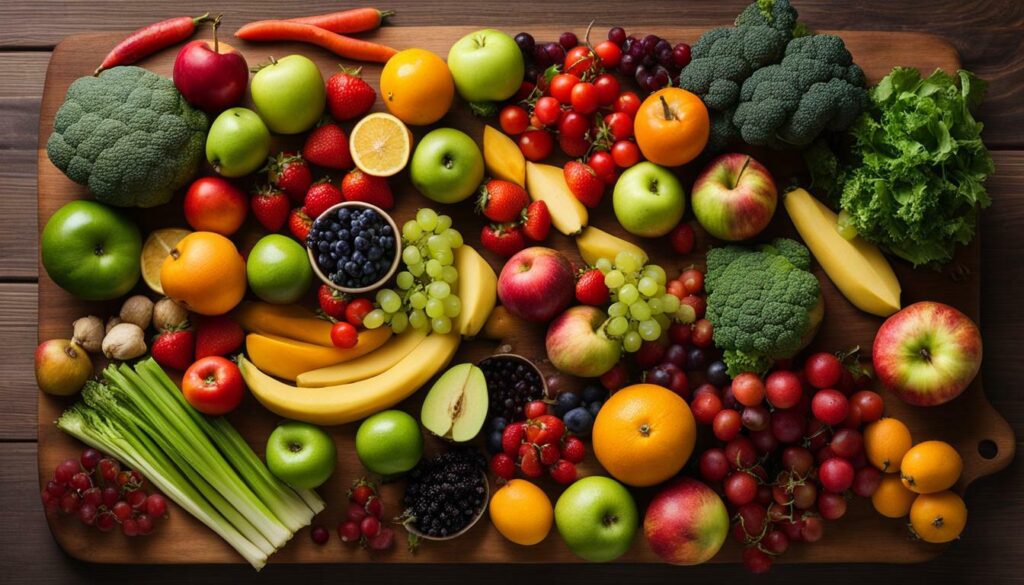
“A well-balanced diet is crucial for the overall health and well-being of domestic geese.” – Goose Expert
Remember to provide clean and fresh water at all times, as geese require access to water for bathing and cleaning. This ensures their feathers remain in good condition and helps support their natural behaviors. By offering a diverse and nutritious diet to domestic geese, you can help them thrive and lead healthy lives.
Conclusion
Geese have a versatile diet, and by offering them a balanced mix of foods, we can ensure their nutritional needs are met. They primarily feed on grass, which provides them with essential vitamins and minerals. However, they also forage for a variety of other foods, including clover, alfalfa, seed heads, wheat, maize, barley, beans, and aquatic plants.
During the autumn and winter seasons, geese increase their carbohydrate consumption to build up reserves and stay warm. While it may be tempting to feed them bread, it is not recommended as it lacks nutritional value. Instead, nutritious foods such as sweet corn, peas, cabbage, cauliflower leaves, lettuce, wheat, and mixed corn can be provided.
Domestic geese, particularly during the breeding season, require additional calcium. Offering them pellets specifically formulated for calcium supplementation can help meet this requirement. In addition, geese can serve a purpose in organic farming systems by grazing to control weeds, fertilize the soil, and contribute to sustainable and natural farming practices. They can also be managed in wildflower meadows, promoting the growth of diverse plant species and supporting the local ecosystem.
Access to water is crucial for geese, as it allows them to bathe and clean themselves. Whether in the wild or in captivity, geese should always have a water source available. In captivity, domesticated geese should be fed a combination of grass, grains, and supplemental fruits and vegetables to ensure a balanced and nutritious diet.
By understanding the diverse diet of geese and providing them with the right foods, we can support their overall health and well-being. So, the next time you encounter these magnificent birds, remember to offer them a variety of nutritious options to keep them happy and healthy!
FAQ
What do geese eat?
Geese primarily feed on grass, but they also forage for a variety of other foods such as clover, alfalfa, seed heads, and aquatic plants.
Can geese eat frogs?
No, geese typically do not consume frogs as part of their natural diet. They primarily feed on vegetation and small invertebrates found in water bodies.
Can geese eat French fries?
No, French fries should not be included in a goose’s diet. These processed foods lack nutritional value and can be harmful to their health.
Can geese eat strawberries?
Yes, geese can eat strawberries in moderation. While they can enjoy the occasional fruit treat, it should not be a significant part of their diet.
Do geese eat meat?
No, geese are primarily herbivores and do not typically consume meat. Their diet consists mainly of vegetation and small invertebrates found in water bodies.
Do geese eat corn?
Yes, geese can eat corn. It is a suitable food for them, especially during the autumn and winter seasons when they require additional carbohydrates to stay warm and build up reserves.
Do geese eat ticks?
No, geese do not primarily feed on ticks. Their diet consists mainly of vegetation and small invertebrates found in water bodies.
Can geese eat chocolate?
No, chocolate should never be fed to geese. It contains theobromine, which is toxic to them. It is best to avoid giving any chocolate to geese to ensure their well-being.
What are the recommended foods for geese?
Nutritious foods for geese include sweet corn, peas, cabbage, cauliflower leaves, lettuce, wheat, and mixed corn. These foods provide essential nutrients and support their overall health.
Do domestic geese have calcium needs?
Yes, domestic geese require additional calcium during the breeding season. Offering them pellets specifically formulated for calcium supplementation can help meet this requirement.
Can geese be used in organic farming systems?
Yes, geese can be used for grazing in organic farming systems. They help control weeds, fertilize the soil, and contribute to a sustainable and natural approach to farming.
How can geese be managed in wildflower meadows?
Geese can be managed in wildflower meadows to maintain and enhance biodiversity. Their grazing habits promote the growth of diverse plant species and support the ecosystem.
Do geese need access to water?
Yes, geese require access to water for bathing and cleaning. Providing them with a water source is essential for their overall well-being.
What should domestic geese be fed?
Domesticated geese should be fed a combination of grass, grains, and supplemental fruits and vegetables to ensure a balanced and nutritious diet.
What should I know about geese and their diet?
Geese have a diverse diet and can eat various foods, including grass, grains, and certain fruits and vegetables. It is important to provide them with a balanced nutritional plan to support their overall health and well-being.

